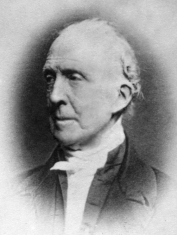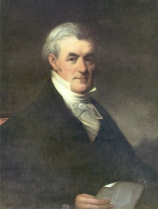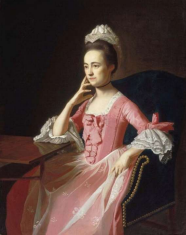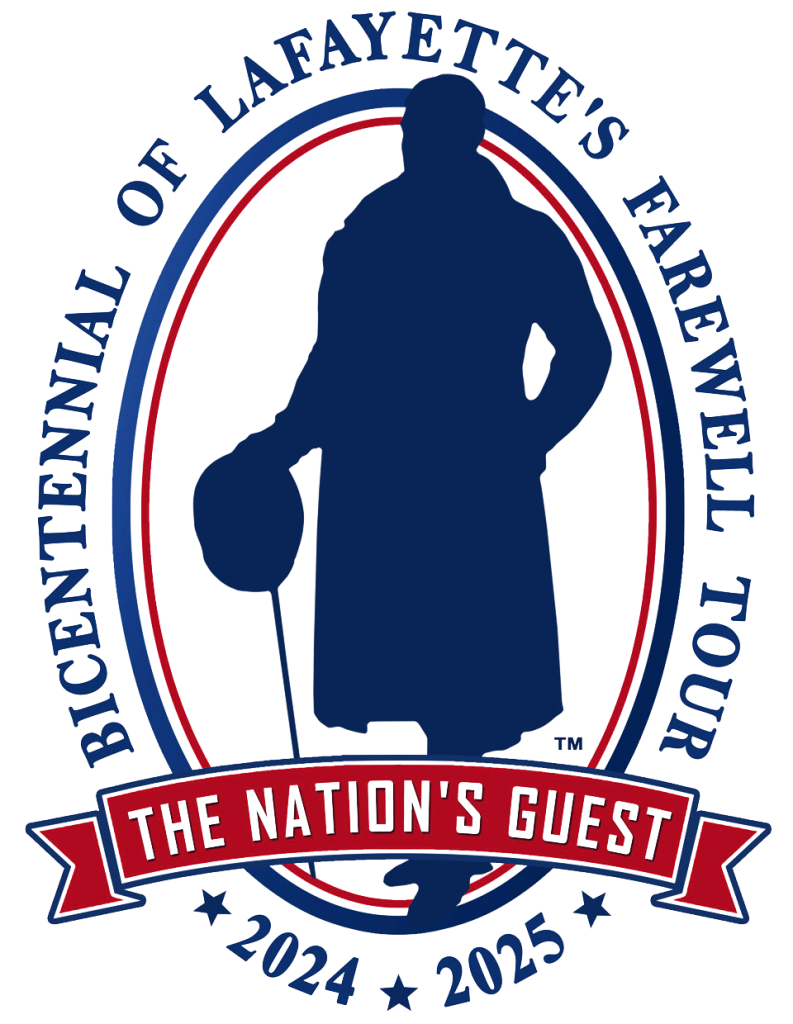This is part of a series on Lafayette’s visit to Massachusetts August 23, 1824 to September 3 1824.
Early Morning
Lafayette awoke to light infantry making an exhibition of its maneuvers under his window. A young man was admitted to see Lafayette and presented him with a sword, one of the swords that Lafayette had purchased for the NCOs of his light infantry unit. It had belonged to the young man’s father who had hoped to present it to Lafayette, but had just died. The young man asked Lafayette to approve of his father having given the sword to his son for whom it would be his most precious possession. Lafayette replied:
“Keep it, guard it carefully so that, in your hands, it can serve to maintain the rights the conquest of which it had so valiantly contributed to in the hands of your father.”
Crossing Into Boston
At 9:00 AM a Cavalcade had formed on Common Street. Lt. Col. Amory was in command. The group proceeded to the Eustis mansion.
The entire route was bordered by militia on foot and on horseback. The carmen of Boston in gleaming white blouses formed a corps of perfectly mounted cavalry. Small boys formed an artillery corps and ran to the head of the column with small cannons to fire salutes.
City Authorities were preceded by the Assistant City Marshal, Captain John Rulstone. They met Lafayette at the Roxbury line at 10:50. Mayor Josiah Quincy III (1772-1864) greeted Lafayette

Josiah Quincy
Mayor Quincy spoke:
“Sir. The Citizens of Boston welcome you on your return to the United States mindful of your early zeal in the cause of American Independence grateful for your distinguished share in the perils and glories of its achievement. When urged by generous sympathy you first landed on these shores, you found a people engaged in an arduous and eventful struggle for liberty with apparently inadequate means and amidst dubious omens. After the lapse of nearly half a century you find the same people prosperous beyond all hope and all precedent; – their liberty secure sitting in its strength – without fear and without reproach.
In your youth you joined the standard of three millions of people, raised in an unequal and uncertain conflict. In your advanced age you return and are met by ten millions of people, their descendants, whose hearts throng hither to greet your approach and to rejoice in it.
This is not the movement of a turbulent populace excited by fresh laurels of some recent conqueror. It is a grave, moral, intellectual impulse.
A whole people in the enjoyment of freedom as perfect as the condition of our nature permits, recur with gratitude, increasing with the daily increasing sense of their blessings, to the memory of those, who, by their labours, and in their blood, laid the foundation of our liberties.
Your name, Sir – the name of Lafayette is associated with the most perilous, and most glorious periods of our Revolution – with the imperishable names of Washington, and of that numerous host of heroes which adorn the proudest archives of American history, and are engraven in indelible traces on the hearts of the whole American people.
Accept, then Sir, in the sincere spirit in which it is offered, this simple tribute to your virtues.
Again, Sir, the citizens of Boston bid you welcome to the cradle of American Independence, and to scenes consecrated with the blood shed by the earliest martyrs in its cause.”
Lafayette answered:
“The emotions of love and gratitude which I have been accustomed to feel on my entering this city, have ever mingled with a sense of religious reverence for the cradle of American, and let us hope it will hereafter be said, of universal liberty.
What must be, Sir, my feelings at this blessed moment, when after so long an absence, I find myself again surrounded by the good citizens of Boston – when I am so affectionately, so honorably welcomed, not only by our friends, but by several successive generations: when I can witness the prosperity, the immense improvements, that have been the just reward of a noble struggle, virtuous morals, and truly republican institutions.
I beg of you, Mr. Mayor, Gentlemen of the City Council, and all of you beloved citizens of Boston to accept the warm thanks of a heart, which has for nearly half a century been devoted to your illustrious city.”
To The Common And The Statehouse
The procession entered the city and proceeded through Washington, Milk, Broad, State, Court and Common Streets to Boylston Street. They then passed through the Common. Extending the whole length in two lines were the pupils of the public schools each bearing a portrait of Lafayette stamped on a ribbon on their breast. A six year old girl, the daughter of an officer begged leave to address the general. She delivered a short address and took a wreath of flowers from her head and placed it on the General’s head.
“Receive these flowers; for you the hand of gratitude Plucked them from the ground which you made fruitful; Let them unite with the laurel on your brow Received from us in the days of your youthful valor. You exiled yourself from sweet friendship, From France, from the arms of a dear wife, And your heart being inflamed with noble pity, Thou would have half been in our troubles, And this land was another home for you.”
Another child approached him and said “My parents taught me to repeat your name with respect, and to consider you a father. The general also replied, “;I consider you as my son.”
The estimated number of spectators was 70,000 on the nearly two mile route of the procession. When the General arrived at the State House, artillery under the command of Major Lobdell fired a salute and another was fired at the Navy Yard in Charlestown.
There were two beautifully decorated civic arches thrown across Washington St.

William Eustis
Lafayette was received by Governor Eustis in the Senate Chamber of the State House with the following speech:
“Sir, our friend – In the name of the Government, and in behalf of the citizens of Massachusetts, I have the honor to greet you with a cordial and affectionate welcome.
We thank God, that he has been pleased to preserve you through the scenes of peril and of suffering which have distinguished your patriotic and eventful life, and that we are indulged with this occasion of renewing to you our grateful acknowledgements for the important services which you have rendered in our common country.
In the last surviving Major General of the American revolutionary army, we recognize a benefactor and friend from a distant and gallant nation; who, inspired by a love of liberty, subjected himself in his youth to the toils and hazards of a military life, in support of our rights. Under our illustrious Washington, you were instrumental in establishing the liberties of our country, while your gallantry in the field secured to yourself an imperishable renown.
With the enjoyment of the blessings of independence, we shall never cease to associate the name of La Fayette, and our prayer to heaven be for his health and prosperity.”
Lafayette replied:
“Sir – When, in the name of the people and government of this State your Excellency is pleased so kindly to welcome an American veteran, I am proud to share the honors and enjoyments of such a reception, with my revolutionary companions and brother soldiers.
Sir, I am delighted with what I see, I am oppressed with what I feel; but I depend upon you as an old friend to do justice to my sentiments.”
He was then conducted to the house at the corner of Park and Beacon Streets where he would be staying.
At 4:00 PM he went to the Exchange Coffee House and had a dinner provided by Col. Hamilton. The French and American flags, joined together, waved above the heard of the president of the banquet, and Mr. Parker made a toast to Louis XVI, while adding that all those who had favored liberty ought not to be forgotten, even when they had worn the crown.
In the evening Lafayette visited with Dorothy Quincy Hancock Scott (1747-1830) who had been married to John Hancock.

When passing her house likely earlier in the day someone pointed to her and said to Lafayette “There sits the widow of your deceased friend”. He caught her eye and put his hand on his heart. She burst into tears and exclaimed “I have lived long enough”
For information on the bicentennial of Lafayette’s tour check out lafayette200.org.































































































